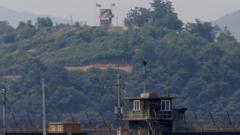As Russian state-run outlets like RT and Sputnik flourish in Africa, the Balkans, and Latin America, experts warn of the potential implications for global narratives and the weakening of democratic discourse.**
Russia's Expanding Media Influence: A Strategic Move Beyond Western Borders**

Russia's Expanding Media Influence: A Strategic Move Beyond Western Borders**
With its state-backed media, Russia is increasing its influence across various regions while Western nations impose sanctions and restrictions.**
In a notable shift of media power, Russia is making strategic advances in global communications through its state-backed broadcasts, RT and Sputnik. Operating in regions often overlooked by Western media, these outlets have gained significant traction, particularly in Africa, Latin America, and parts of the Middle East, even as the U.S., UK, Canada, and EU impose sanctions against them amid growing concerns over disinformation.
Take, for instance, the case of Javier Gallardo, a truck driver in Chile who stumbled upon RT during a routine television session. Confused by content he had not been initially prepared to receive, Javier's experience underscores the perplexity of viewers encountering Russian state media in areas where traditional news sources are declining or withdrawing. Chilean private station Telecanal's collaboration with RT sparked controversy, prompting regulatory scrutiny that fueled audience skepticism.
In the aftermath of Russia's military engagement in Ukraine, Western nations restricted RT's operations, branding the network as a disinformation apparatus. Yet, throughout this tumultuous time, its global reach has only widened. RT's establishment of new bureaus across Africa and its recent open training programs for international journalists signal a deliberate effort to cultivate supportive narratives in diverse locales.
Renowned scholars like Dr. Kathryn Stoner recognize that Russia's media endeavors resemble water seeping through cracks in concrete—a strategic infiltration into regions with historical grievances against the West. This enables Russia to cultivate an image as a defender of the Global South, leveraging local sentiments that resonate with audiences wary of Western influence.
The manipulation of narratives remains key to RT's strategy. While often seen in the West as a propagandist outlet, in many other parts of the world, RT is viewed as a credible source of information. Research from the University of Glasgow indicated that audiences sometimes recognized biases in RT but often lacked the tools to fully dissect these influences, allowing the network to shape perceptions stealthily.
With speculation that Russia aims to fortify alliances and build economic ties, the continent of Africa holds particular significance. Anti-colonial sentiments coupled with a history of Soviet solidarity during liberation movements forge a path of favorable views toward Russian involvement. The recent expansion of Russian media has coincided with a retreat of Western coverage, leaving a void that state-funded outlets are keen to fill.
This dynamic also plays out in Latin America, where RT broadcasts are available for free in numerous countries, positioning itself as an alternative to underfunded local news services. Similarly, RT Arabic targets pro-Palestinian audiences in the Middle East, leveraging current events to propagate its ideology.
Quantifying the real impact of Russian-backed media poses challenges, with claims of 900 million viewers often questioned as inflated. Nevertheless, phenomena such as the relative lack of resistance to Russian influence in Africa's Sahel point to a deeper narrative gained traction among vulnerable populations. The Kremlin's continual framing of its actions in Ukraine as responses to NATO expansion resonates particularly within academic and political circles in regions like Latin America.
Ultimately, observers like Dr. Stephen Hutchings caution that by curtailing media funding and retreating from global discourse, Western powers inadvertently provide space for Russia's narrative to thrive. The maneuvering of RT and Sputnik across continents reflects a calculated strategy to redefine global narratives while eroding established democratic ideals. As Russia expands its media presence, the implications for international trust and the stamina of democracies remain significant concerns moving forward.
Take, for instance, the case of Javier Gallardo, a truck driver in Chile who stumbled upon RT during a routine television session. Confused by content he had not been initially prepared to receive, Javier's experience underscores the perplexity of viewers encountering Russian state media in areas where traditional news sources are declining or withdrawing. Chilean private station Telecanal's collaboration with RT sparked controversy, prompting regulatory scrutiny that fueled audience skepticism.
In the aftermath of Russia's military engagement in Ukraine, Western nations restricted RT's operations, branding the network as a disinformation apparatus. Yet, throughout this tumultuous time, its global reach has only widened. RT's establishment of new bureaus across Africa and its recent open training programs for international journalists signal a deliberate effort to cultivate supportive narratives in diverse locales.
Renowned scholars like Dr. Kathryn Stoner recognize that Russia's media endeavors resemble water seeping through cracks in concrete—a strategic infiltration into regions with historical grievances against the West. This enables Russia to cultivate an image as a defender of the Global South, leveraging local sentiments that resonate with audiences wary of Western influence.
The manipulation of narratives remains key to RT's strategy. While often seen in the West as a propagandist outlet, in many other parts of the world, RT is viewed as a credible source of information. Research from the University of Glasgow indicated that audiences sometimes recognized biases in RT but often lacked the tools to fully dissect these influences, allowing the network to shape perceptions stealthily.
With speculation that Russia aims to fortify alliances and build economic ties, the continent of Africa holds particular significance. Anti-colonial sentiments coupled with a history of Soviet solidarity during liberation movements forge a path of favorable views toward Russian involvement. The recent expansion of Russian media has coincided with a retreat of Western coverage, leaving a void that state-funded outlets are keen to fill.
This dynamic also plays out in Latin America, where RT broadcasts are available for free in numerous countries, positioning itself as an alternative to underfunded local news services. Similarly, RT Arabic targets pro-Palestinian audiences in the Middle East, leveraging current events to propagate its ideology.
Quantifying the real impact of Russian-backed media poses challenges, with claims of 900 million viewers often questioned as inflated. Nevertheless, phenomena such as the relative lack of resistance to Russian influence in Africa's Sahel point to a deeper narrative gained traction among vulnerable populations. The Kremlin's continual framing of its actions in Ukraine as responses to NATO expansion resonates particularly within academic and political circles in regions like Latin America.
Ultimately, observers like Dr. Stephen Hutchings caution that by curtailing media funding and retreating from global discourse, Western powers inadvertently provide space for Russia's narrative to thrive. The maneuvering of RT and Sputnik across continents reflects a calculated strategy to redefine global narratives while eroding established democratic ideals. As Russia expands its media presence, the implications for international trust and the stamina of democracies remain significant concerns moving forward.



















